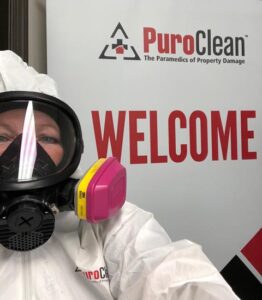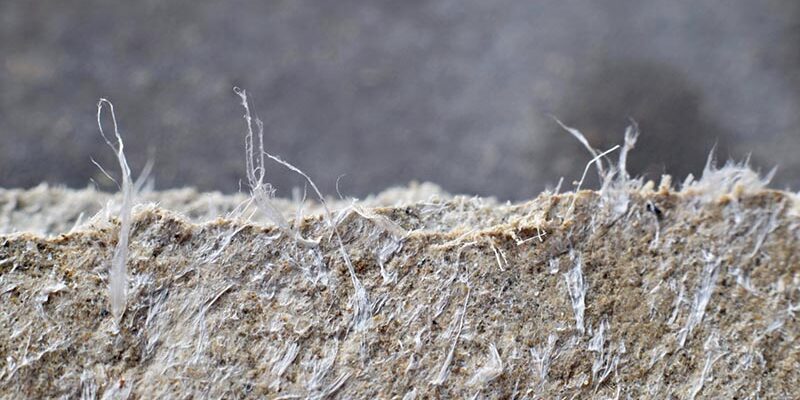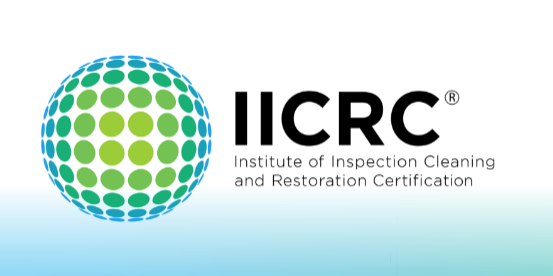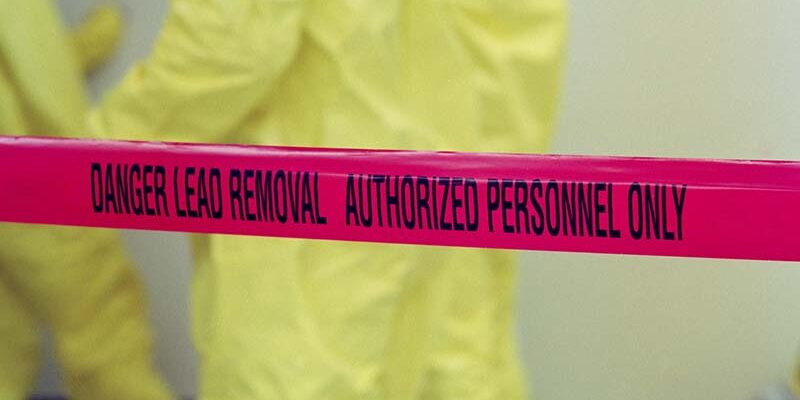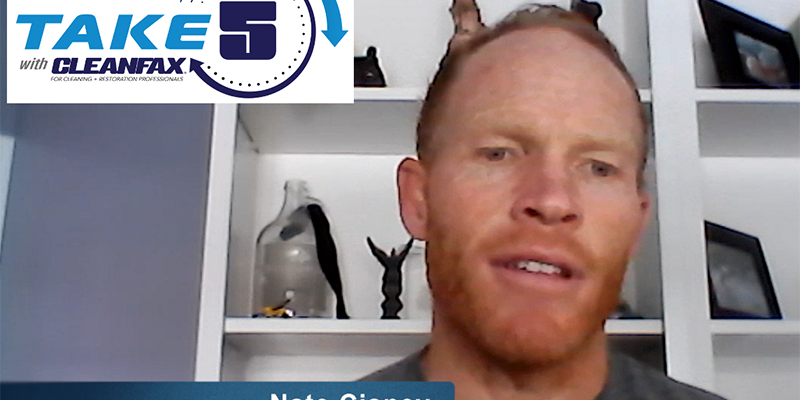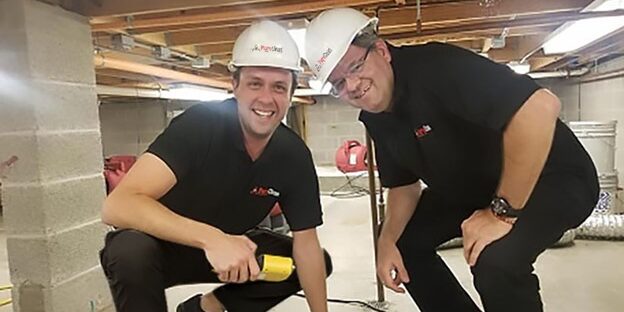Finding a Niche in Biohazard Cleanup
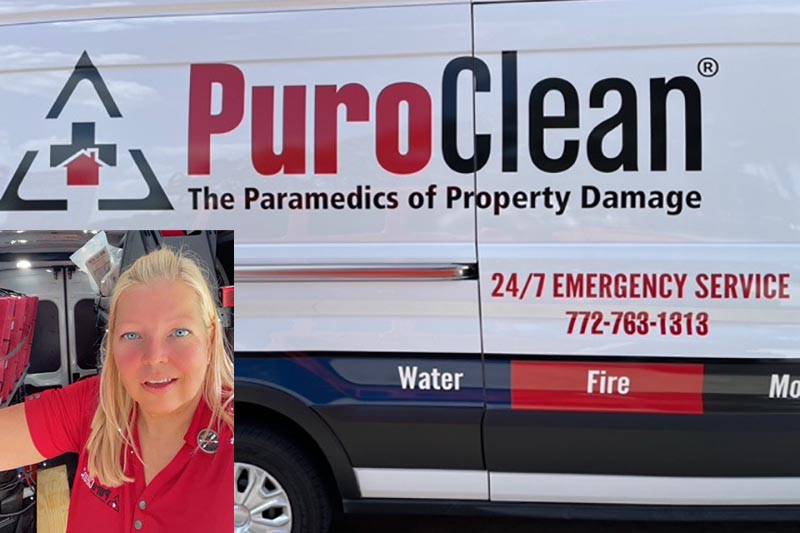
Karen Argus, owner of PuroClean of Stuart in Stuart, Florida, came to the restoration industry after a 20-year career in nursing where she worked as a critical care and home care nurse. Though she had always dreamed of owning a business, she didn’t expect to end up in the restoration industry—but she has found that her background in the medical field prepared her in multiple ways for the challenges of owning a restoration company, especially one with a niche in trauma scene and biohazard cleanup.
Karen decided she was ready to move on from nursing after her husband’s job took them to South Florida in 2019. They researched franchises together and determined PuroClean was the right fit for her. “I had no idea what I was getting into though; I’ll be very honest with you. This is real construction work. This is a hard job.”
During her first year in business, she got a call from a client who needed help cleaning a garage where someone had died. At this point, Karen had training in water, fire, and mold remediation, but she did not feel prepared to handle a biohazard cleanup job that involved blood and other bodily fluids. She passed on the job, but that call stuck with her, sparking an interest in trauma scene cleaning as a new avenue for her business and another way to help people facing a crisis. “I didn’t want to turn down another unattended death if I didn’t have to,” she said. Karen contacted Darren Hudema, director of training for PuroClean, to find out what training might be available. She learned that Darren had partnered with Jeff Jones to bring the Microbial Warrior® training course to PuroClean’s academy. “I was the first person to sign up.”
Biohazard training
The Microbial Warrior® course taught the skills and protocols needed to handle different biohazards, as well as proper use and care of personal protective equipment, some of which was originally developed for the medical field. Karen notes that with her background in medicine, “I just felt like this was my niche. It felt comfortable to me.” One week after completing her training, she got another call to clean an apartment that had been the site of an unattended death.
This turned out to be a huge job full of learning experiences. One challenge they faced was getting odors out of grout and concrete. Fearing they would have to rip out and replace these materials, Karen turned to an expert for help. “What’s really nice is that Jeff Jones, the instructor for Microbial Warrior®, he stays on board with you. He’s part of your team, so when you need something, you have a question, you have a problem, you can call him and he will talk you through it and figure it out with you,” Karen explains. With Jeff’s help, they decided to try a product called ProKure, which can be applied as a liquid or gas to destroy odor-causing molecules in the materials, avoiding extensive demo.
Revenue and regulations
In 2022, about 40% of PuroClean of Stuart’s revenue came from just four biohazard jobs. The majority of the company’s calls are for mold-related jobs, which make up 50% of overall revenue. While the biohazard work clearly generates more revenue per job for Karen’s company, she notes that the jobs are often long, complicated, and dangerous, requiring specialized equipment and higher overhead expenses to do the work correctly and safely.
Although Karen and her team received training before tackling any biohazard jobs, regulations for this type of work vary widely by state. In Florida, biohazard cleanup is an unregulated industry. “Anyone can call themselves a crime scene cleaner,” Karen notes. This is both dangerous, and a challenge for companies like hers because the market can be flooded with untrained contractors willing to work for less. “They have no idea how to protect themselves from bloodborne pathogens. They don’t know what anti-microbials to use to kill or neutralize different pathogens, and so you have a scenario where people are asking for help and getting subpar help, and they don’t know it because they don’t know the industry is unregulated,” Karen explains.
Growing the biohazard niche
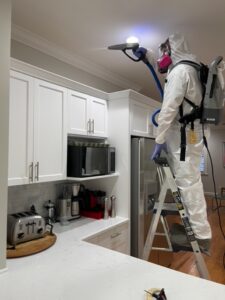 Karen notes that Jeff Jones and others are working to create greater standardization for biohazard cleanup, but in the meantime, she must market her company’s certifications and expertise to stand out from the crowd of untrained cleaners. One way she has done this is by making connections with the local Sherrif’s Department and a private body transport company. Karen educates these partners about the type of work they do, the certifications they have, and the protocols they follow when dealing with a trauma or crime scene. Her company created a brochure that highlights their Microbial Warrior® training, as well as the fact that they are a registered transporter of biomedical waste with the Florida Department of Health.
Karen notes that Jeff Jones and others are working to create greater standardization for biohazard cleanup, but in the meantime, she must market her company’s certifications and expertise to stand out from the crowd of untrained cleaners. One way she has done this is by making connections with the local Sherrif’s Department and a private body transport company. Karen educates these partners about the type of work they do, the certifications they have, and the protocols they follow when dealing with a trauma or crime scene. Her company created a brochure that highlights their Microbial Warrior® training, as well as the fact that they are a registered transporter of biomedical waste with the Florida Department of Health.
In addition to highlighting her training, Karen also finds that her nursing background and communication skills help her to land all types of restoration jobs. Whether it’s a flood call, a mold issue, or a trauma scene, the client on the other end of the phone is in the midst of a crisis on what might be one of the worst days of their lives. They are concerned about the health and safety of their families and themselves. Karen says that when people find out she was a nurse, they are typically more willing to trust her. She uses her decades of experience communicating with people in difficult situations to respond to her clients with empathy and offer steady reassurance.
Looking ahead, Karen hopes to continue to grow the biohazard side of her business, and she serves as a kind of ambassador for other PuroClean franchisees interested in the Microbial Warrior® course. She’s always willing to talk with other business owners about her positive experience and how valuable the training is, and she says this kind of community spirit is what drew her to PuroClean in the first place: “The nice thing about PuroClean is that we can all work together. We like to help each other out.”

